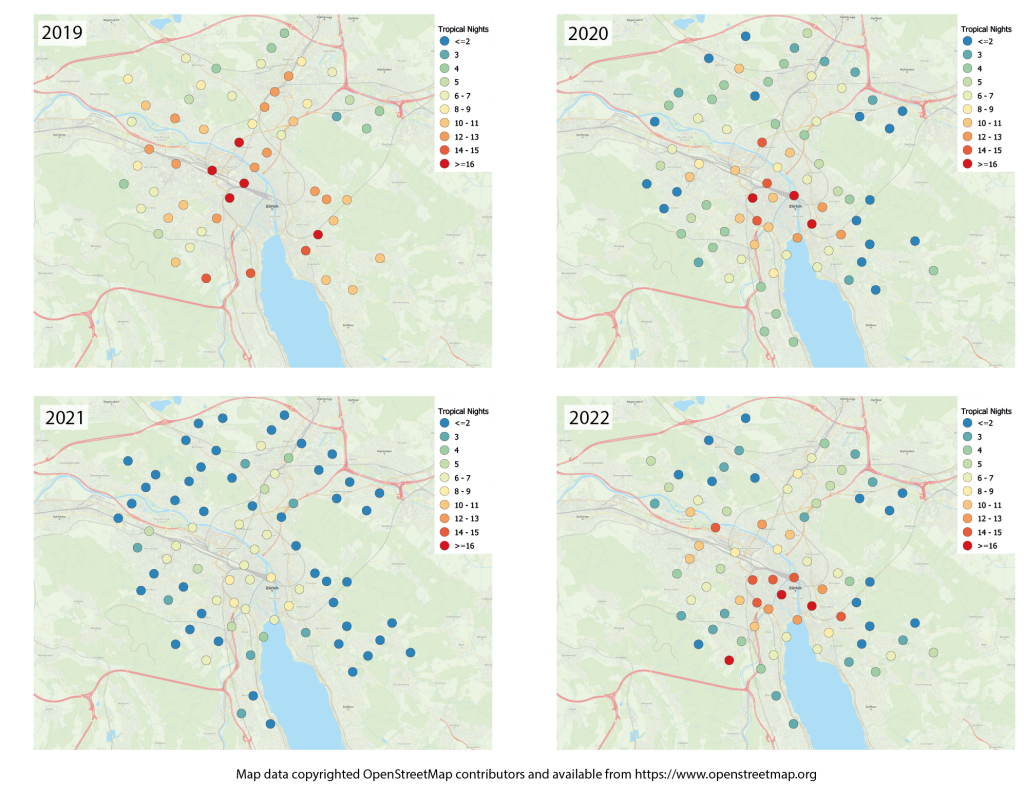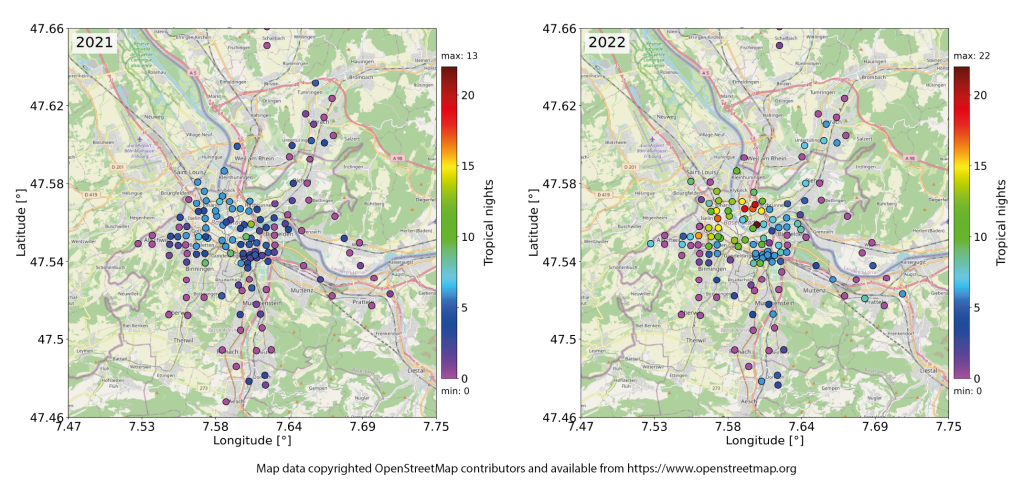Navigation menu
- Education
- Emissions & Air Quality
- Infrastructure & Services
- Meteorology & Climate
- News
- Physical Chemistry
- Projects
Although the official summer season is far from ending, it is probably safe to say already now that Switzerland is currently experiencing one of the sunniest, driest and hottest summer of the last decade. As published within the MeteoSwiss Climate-Blog article from July 29th 2022, July 2022 is ranking as the fourth warmest July (after July 2015, 2006 and 1983) ever measured – after an already very warm June 2022, again ranking on place number four after the June 2019, 2017 and 2003.
While hot temperatures are the preferred weather condition for some, it becomes a health threat to others. In cities, during heatwaves, the low albedo, all together with rather limited green areas and large paved areas, can act as amplifying factors, leading to far higher temperatures than peri-urban areas (see e.g. this article). But there’s more: While in rural areas, the temperatures rapidly decrease after sunset, cities act as a heat storage facility. The large volumes of concrete, accumulating the daytime heat, slowly release it at night. In combination with a rather restricted ventilation due to obstacles (buildings, heterogeneous street canyon structures), nights can become annoyingly warm. Up to the point that sleep quality is heavily impacted for some persons living in certain areas of the city. How was your sleep quality this summer? Was it far worse than in the last years? For the author of this text, as well as a selection of friends and co-workers, this sure seemed to be the case. But is this subjective experience backed up by data?
Together with our colleagues from meteoblue AG, we performed a preliminary analysis of the summer nights from 2019 to 2022, analyzing the number of tropical nights between June 1st to August 10th – a more complete study covering all summer months will be following later this year. First, what is a tropical night? This is defined as a period between 18 UTC and 6 UTC (8 PM to 8 AM local Swiss time), during which the minimal temperature does not drop below 20°C.
So, what are the results? Note that only stations passing our quality-check were illustrated, therefore not all stations are shown for every year: especially in 2019, the station network in Zurich was not yet fully established, neither was the network in Basel. Nevertheless, we are very confident that this does not jeopardize following preliminary statement: This year’s summer is maybe exceptional in terms of sunny days, daytime heat and low precipitation, but fits comparably well into the preliminary warm summers of 2019 and 2020 regarding tropical nights in Zurich and Basel.

This summer, so far, 20 stations reported 10 tropical nights or more, but they were all located in the center of Zurich. Other areas, like for instance Oerlikon, Schwamendingen, or Wiedikon, mostly reported less than 10 tropical nights so far (Fig. 1d). This was not the case in 2019 (Fig. 1a); there, a total of 30 stations reported 10 tropical nights or more, spread over a large area of Zurich (centre, Wollishofen, Hirslanden, Fluntern, Altstetten, Unterstrass and Oerlikon). The summers of 2020 and 2021 were, in that sense, better representative for our latitudes: stations in the city centre reported around 7-16 (average: 12.6) tropical nights in 2020, and the summer 2021 was even less tropical with values ranging from 7-9 (average: 7.7) in the city centre, with even lower values in regions outside the core of the city (average of 5.4 and 3.0, respectively, in comparison to 9.3 and 6.0 in 2019 and 2022 respectively, Fig. 1b and c). Results for Basel compare very well to the data measured in Zurich for the years 2021 and 2022, as illustrated in Figure 2.

What does this tell us? The heatwaves in the summer 2019 must have been – statistically speaking – more sleep-depriving than the heatwaves in 2022, as the nighttime temperatures stayed more often at values above 20°C. Nevertheless, many nights have personally felt extremely uncomfortable in 2022. Why was that the case? In Zurich, one possible explanation would be the frequency of thunderstorms – especially in June and early July – rapidly cooling down temperatures to the sub-twenties. This prevented the night from being classified as “tropical”, but probably did not make it more pleasant with regard to sleep quality. As thunderstorms are often accompanied by precipitation, they leave behind very moist air with dewpoint temperatures near the saturation. Thus, even if the air temperature is below 20°C, ventilating a room will lead to an increasing moisture content. Taking a dewpoint of 18°C as an example, this will make your sleep rather uncomfortable, as the perspired sweat is taken up less well by the surrounding air. The consequence: You’ll feel too warm to sleep comfortably, even without any blanket.
Our partner, meteoblue AG, has taken a glimpse at how the number of tropical nights will evolve in the future, considering our rapidly changing climate (see this post). And the future does not really look bright: in Zurich, the number of tropical nights could experience a 6.8-fold increase, and in Basel a 7.2-fold increase by the end of this century (following the RCP 8.5 scenario). Luckily, the city authorities have already taken action, and are considering different heat mitigation measures, as published here.
